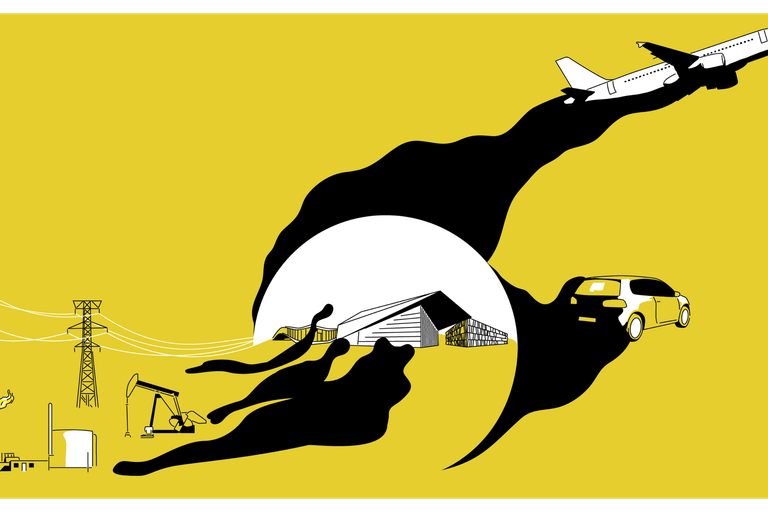The President of the Swiss Academy of Sciences, Marcel Tanner, starts off the proceedings with a firm declaration: “The scientific community needs to have the courage to look itself in the eye.” Due to its competitiveness and rampant globalisation, science generates excessively high emissions, contrasting with its role to propose and develop solutions to tackle climate change.
In actual fact, a scientist’s carbon footprint is considerably larger than average, since they often travel by plane to attend symposiums, collect awards, present their work or participate in exchanges with colleagues. In the past, the more you travelled by plane, the more important you were seen to be. But nowadays, you are more consistent if you reduce the number of flights you take, says Ulrich Weidmann, Vice President of Human Resources and Infrastructure at ETH Zurich. He then provides some highly revealing statistics from his institution: more than half of CO2 emissions come from business travel, and air travel makes up 93% of that figure.
Determined to tackle this situation, a group of students started a movement in 2016, leading ETH Zurich to set itself the official target of reducing its emissions by 11% by 2025. It is indeed interesting to note that, well before this student movement began, a top-down strategy recommending a new approach within different departments had had very little effect. On the subject of tangible solutions, video conferencing has emerged as the main alternative to travel – representing a significant step in a sector that places particular value on adding conferences to one’s CV.
A tidal wave of positive attitudes led by the younger generation
In fact, there is only a small to negligible correlation between business travel and academic performance, EPFL’s Sustainable Development Coordinator Philippe Vollichard points out. “Aside from this, thanks to pressure from young climate activists, everything is different now – we’re seeing a real tidal wave of positive attitudes. It’s incredible!” he exclaims. The Lausanne-based institution’s main strategy is, in fact, to achieve carbon neutral status in 2020, since it is the biggest consumer of electricity in the canton of Vaud. To do this, EPFL is relying on an internal offsetting system and a mobility fund. However, “the serious nature of the problem should not stop us from finding enjoyable solutions, such as the Bike to work scheme,” says Vollichard with a smile.
His optimism does not appear to be shared by the political science student and climate activist Marie-Claire Graf, who is participating in the debate: “We are hearing a lot of promises following the results of studies carried out in universities, but the reality is bleaker: what is actually being done at this point is quite simply ridiculous when you consider the scale of the problem.” The words of climatologist Martine Rebetez would appear to confirm the gravity of the situation: “We are still a long way from zero emissions”. For this scientist who has spent many years working on climate issues, it is clear that much more investment is needed, particularly in the field of “transformative” research. Nonetheless, she concedes that climate movements have led to a complete change in mindset. “In the past, I was somewhat alone in this, but nowadays a lot more support is felt.” Jan Zumoberhaus, a human geography student at the University of Fribourg, retorts, addressing the scientific institutions: “Now that you have the support, you should be able to do more.”
Awareness is growing at CERN, too, with numerous initiatives being introduced to reduce the amount of energy consumed by machines and buildings, says the Centre’s Energy Coordinator for the Technology Sector, Serge Claudet. In addition, an official environmental report is currently being drafted with a commitment to reduce greenhouse gas emissions by over 30% in the next five years (the actions identified on the particle accelerators are the primary contributors). Today CERN’s one-of-a-kind equipment is very energy-intensive: the world’s largest particle physics centre is the principal consumer of electricity in the canton of Geneva.
Circular, non-compartmentalised thinking
The participants participated actively in the debate, proving that the subject matter strongly resonates with the current real concerns of the scientists present. There was also considerable discussion on sustainability criteria in the awarding of grants and funding applications in general. On the whole, it is clear that, despite efforts to take action in these areas, most of the research currently being conducted is not “sustainable”, laments Marcel Tanner.
When an audience member asks about the extent to which efforts to bring about real change should come mostly from personal initiatives or from top-down initiatives, Ulrich Weidmann responds by stating plainly that “the two are not mutually exclusive” and that it is all a question of balance and consistency. “All sections of society – politicians, scientists, economists, etc. – need to be ready to initiate substantial changes, and quickly. We need to think in a circular, non-compartmentalised way,” adds Marie-Claire Graf.
As a result of the student-led climate strike, the institutions attending the conference acknowledge that they have now become more ambitious, more determined and confident in light of the real momentum and the outstanding pool of ideas that is taking shape within each of them. That being said, as far as air travel is concerned, all were in agreement that it is, and will remain, unavoidable but it should be the norm, in the future, to firstly prioritise rail travel and secondly use local human resources as far as possible.
Finally, Marcel Tanner concludes: “It is high time to profoundly reconsider scientific culture, to combine efficiency and relevance and to focus on the real problems that society faces.”











